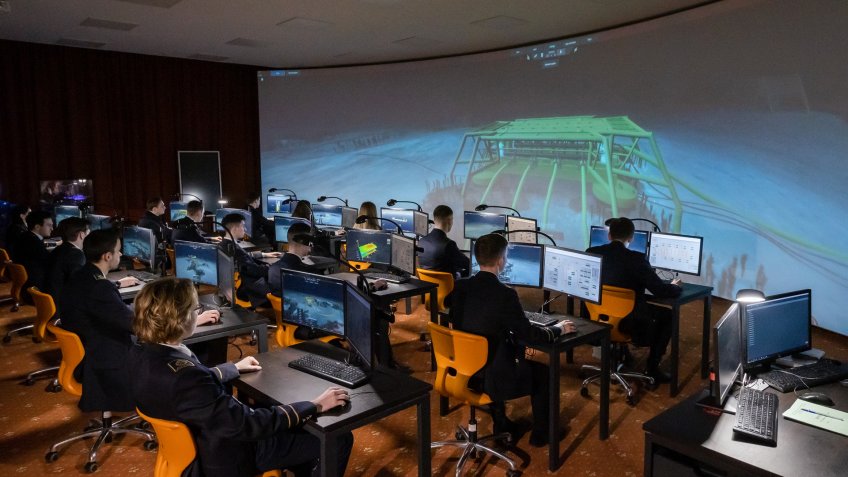
This is a historic achievement. No other Russian institution of higher education has managed to do anything like this before.
The updated World University Ranking by Subject 2023 was released on Wednesday, March 22. It is traditionally compiled by experts of the British company Quacquarelli Symonds (QS), which along with THE and ARWU is the most prestigious international agency engaged in grading universities. This year they ranked more than 3 thousand educational institutions from 161 countries.
St. Petersburg Mining University ranked third in the world in Mineral & Mining Engineering. Other leaders in this category include such pillars of mining education as Colorado High School (USA), McGill University (Canada), and Queensland University (Australia).
Russia's oldest technical university has been in the top 20 of QS subject rankings for the seventh year in a row, but it has never risen so high. Such a great success was mainly due to the University impeccable reputation among national and foreign employers (91.8 points out of a possible 100), high opinion of the international academic community (85.8) and increased publication activity. The citation rate per article of the university scientists in the period from 2016 to 2021 reached 74.5 points, although a few years ago this figure was below 50. The Hirsch index also rose to 72.
Mining Rector Vladimir Litvinenko, evaluating the results of QS subject rankings, called them "logical and well-deserved." He noted that for two and a half centuries the university "has absorbed all the best and created a comfortable scientific and educational environment that gives opportunities for self-fulfillment to students, teachers, and scientists."
"Our subsoil is our competitive advantage. But in order to monetize natural capital, to turn it into human, natural and social capital, we need competent personnel and science. More precisely - the unity of science, technology and education. Without this, it is impossible to ensure the sustainability of the domestic economy and preserve Russia's sovereignty. We not only train qualified young specialists, give them all the necessary knowledge and skills, and do it with high quality, which is confirmed annually by surveys of employers, but also generate new knowledge. Today, each of our research centers conducts serious research work in 12-15 areas that are important for our mining and oil and gas industry. The task is to increase the efficiency of raw material resources use for the benefit of our society's development. Its positive solution depends, first of all, on the actions of the Government and its ability to promote cooperation between science and business," Vladimir Litvinenko said.
He also said that the scientists of St. Petersburg Mining University provide scientific support for many projects of the leading domestic companies. Among their achievements is, for example, the launch of the Titan-Polymer plant in the Pskov region last December, which produces BOPET film. Its use in the construction of greenhouses can provide the same light permeability as glass and at the same time more effectively reflect the thermal radiation, i.e. save energy. The production volume of various film modifications is 72 thousand tons, which allows us to provide 100% of the Russian consumers.
The university's specialists are also working on the creation of catalysts for the domestic oil refining industry; needle coke, which is in demand in the creation of metallurgical electric arc furnaces; and a number of other innovations that will increase the technological sovereignty of our country.
A special place in their research activities is occupied by work at Vostok Research Station, in Antarctica. This is the coldest point on Earth, and it is there that under the lifeless ice plateau, at a depth of more than 3,700 meters, lies the vast Lake Vostok, deeper than only Baikal in Russia. Twice, in 2012 and 2015, scientists from St. Petersburg Mining University, together with colleagues from the AARI opened it up and took samples of relict water, isolated from the Earth's atmosphere for millions of years. In addition, every year, including this season, they take ice cores, formed hundreds of thousands and even a million years ago, from the well above the lake.
The study of these cylinders allows us to obtain reliable results on the determination of the carbon cycle and its influence on the planet's climate. Today, a close connection between global climate change and the concentration of carbon dioxide (CO2) and methane (CH4) in the atmosphere has already been revealed. But is it possible to argue that the current temperature on the planet is beyond natural transformations? And if so, what is their cause? Human activity or, for example, volcanic eruptions, during which enormous emissions of carbon dioxide occur? The exact answer to this question can also be obtained in Antarctica.
The polar explorers of the Mining University plan to penetrate Lake Vostok again, take samples of water and bottom sediments, and study deep phenomena affecting the Earth's magnetosphere. By drilling down to the bedrock and conducting field studies at the bottom, they plan to improve the quality of measurements of the most complex physical processes occurring in the interior of the planet, and to obtain scientific results of the highest level of reliability. This means making more accurate predictions of climate change.



